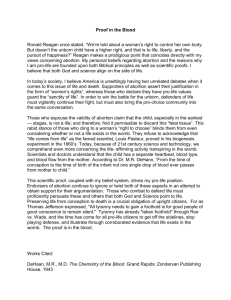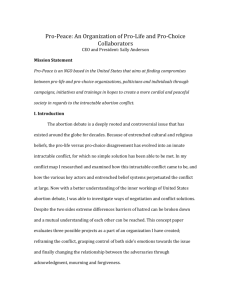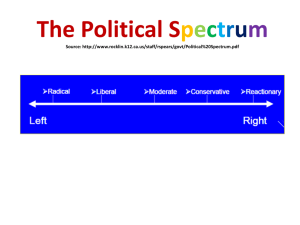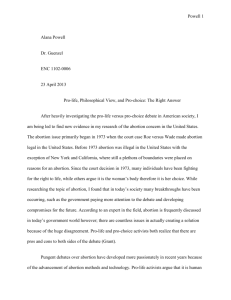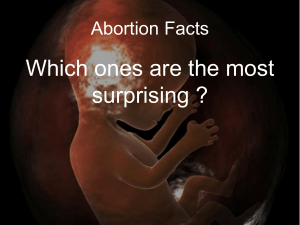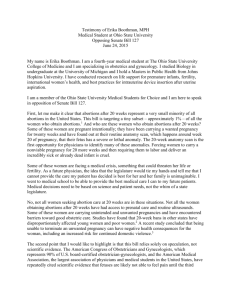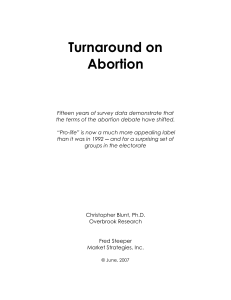To be "pro
advertisement
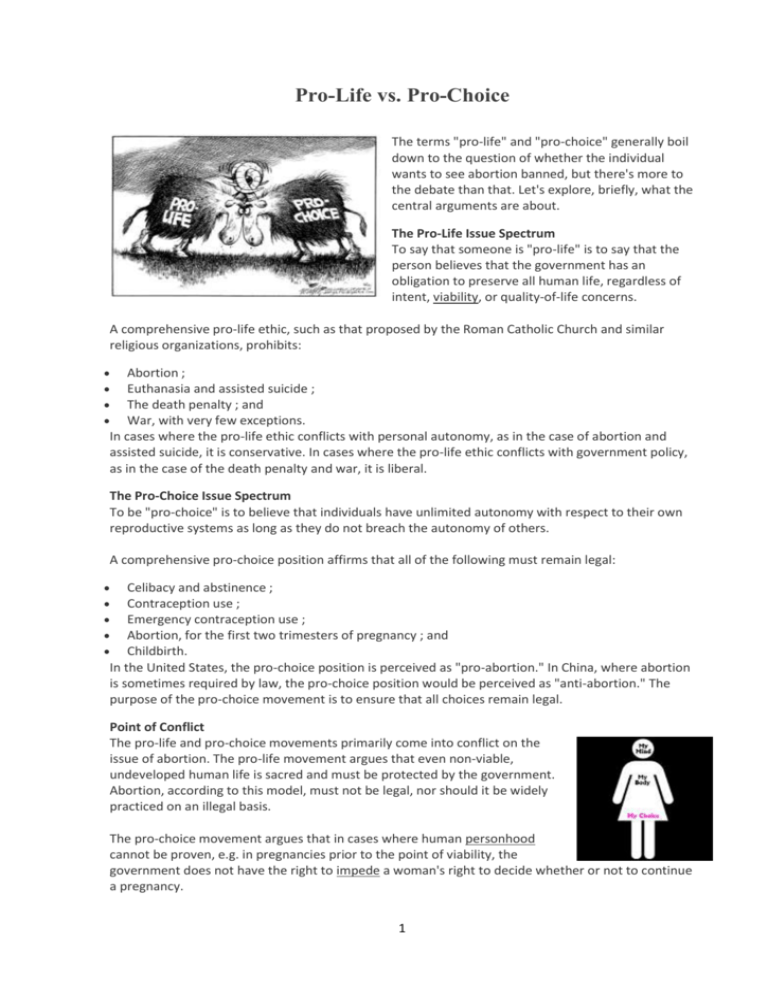
Pro-Life vs. Pro-Choice The terms "pro-life" and "pro-choice" generally boil down to the question of whether the individual wants to see abortion banned, but there's more to the debate than that. Let's explore, briefly, what the central arguments are about. The Pro-Life Issue Spectrum To say that someone is "pro-life" is to say that the person believes that the government has an obligation to preserve all human life, regardless of intent, viability, or quality-of-life concerns. A comprehensive pro-life ethic, such as that proposed by the Roman Catholic Church and similar religious organizations, prohibits: Abortion ; Euthanasia and assisted suicide ; The death penalty ; and War, with very few exceptions. In cases where the pro-life ethic conflicts with personal autonomy, as in the case of abortion and assisted suicide, it is conservative. In cases where the pro-life ethic conflicts with government policy, as in the case of the death penalty and war, it is liberal. The Pro-Choice Issue Spectrum To be "pro-choice" is to believe that individuals have unlimited autonomy with respect to their own reproductive systems as long as they do not breach the autonomy of others. A comprehensive pro-choice position affirms that all of the following must remain legal: Celibacy and abstinence ; Contraception use ; Emergency contraception use ; Abortion, for the first two trimesters of pregnancy ; and Childbirth. In the United States, the pro-choice position is perceived as "pro-abortion." In China, where abortion is sometimes required by law, the pro-choice position would be perceived as "anti-abortion." The purpose of the pro-choice movement is to ensure that all choices remain legal. Point of Conflict The pro-life and pro-choice movements primarily come into conflict on the issue of abortion. The pro-life movement argues that even non-viable, undeveloped human life is sacred and must be protected by the government. Abortion, according to this model, must not be legal, nor should it be widely practiced on an illegal basis. The pro-choice movement argues that in cases where human personhood cannot be proven, e.g. in pregnancies prior to the point of viability, the government does not have the right to impede a woman's right to decide whether or not to continue a pregnancy. 1 Religion and the Sanctity of Life What politicians on both sides of the debate generally fail to acknowledge is the religious nature of the conflict. If one believes in an immortal soul that is implanted at the moment of conception, and if personhood is determined by the presence of that immortal soul, then there is little difference, in effect, between terminating a week-old pregnancy or killing a living, breathing person. Rational members of the prolife movement do acknowledge that there is a difference in intent--abortion would be, at worst, involuntary manslaughter rather than murder--but the consequences, i.e. the death of a human person, are regarded by pro-lifers in much the same way. Religious Pluralism and the Obligation of a Secular Government The trouble is that the United States government cannot acknowledge the existence of an immortal soul implanted at conception without taking on a specific, theological definition of personhood. Some theological traditions teach that the soul is implanted at quickening--when the fetus begins to move--and not at conception. Other theological traditions teach that the soul is implanted at birth. Some traditions teach that the soul is implanted well after birth. And still other theological traditions teach that there is no immortal soul at all. Can Science Tell Us Anything? There is no scientific basis for the existence of a soul, but there is no scientific basis for the existence of subjectivity, either, which makes it difficult to ascertain concepts such as "sanctity." Physics alone can't tell us whether a human life is worth more or less than a rock. We value each other for social, emotional reasons; science does not tell us to do it. But to the extent that we do have anything approaching a scientific definition of personhood, it would most likely rest in our understanding of the brain. That being the case, it's worth noting that neocortical development, which scientists believe makes emotion and cognition possible, does not begin until the late second or early third trimester of pregnancy. Two Other Standards of Personhood Some pro-life advocates argue that it is the presence of life alone, or of unique DNA, that defines personhood. The problem with the life-alone argument is that many things that we do not consider living persons meet that criteria. Our tonsils and appendices are certainly both human and alive, but we do not consider their removal as constituting anything close to the killing of a person. The unique DNA argument is more compelling, but also poses problems. Sperm and egg cells, for example, contain the genetic material that will later form the zygote. The question of whether certain forms of gene therapy also creates new persons would also be raised by this definition of personhood. The Burden of Proof Before the government can prove that a homicide has taken place, it must first produce evidence--a person's body, or sufficient body tissue as to constitute a body for legal purposes. It would not do for homicide prosecutions to proceed based solely on a philosophical or religious conviction that a murder has taken place. Ronald Reagan famously said in the 1980s that if the government is to err, it must err on the side of 2 protecting life. In practice, to err on the side of life in criminal prosecutions is to convict without adequate evidence. Our system of jurisprudence is not consistent with this goal. No Choice On the other hand, the pro-life vs. pro-choice debate tends to overlook the fact that the vast majority of women who have abortions do not, in fact, do so entirely by choice. Circumstances put them in a position where abortion is the least self-destructive option available to them. According to a study conducted by the Guttmacher Institute, 68% of women who have abortions in the United States say that they cannot afford to have children and 27% cite this as their primary reason for terminating the pregnancy. 20% cite health reasons. 38% are young women either hiding pregnancies from their parents, or ordered by their parents to terminate their pregnancies. Our Shared Responsibility One of the best-kept secrets of the pro-life and pro-choice movements is that the two movements ultimately overlap to the extent that they share the goal of reducing the number of abortions. They differ only with respect to degree and methodology. Unfortunately, politicians benefit more from having two polarized, angry movements than they do from having two less polarized, less angry movements. We live in a culture today where the decision not to have sex is seen as ridiculous. Abstinence is the default choice, and the pro-choice movement has an obligation to make it a socially acceptable choice. Likewise, the pro-life movement has been so tangled up in policy objectives that it has failed to actually reduce the number of abortions. The Future of Abortion Thirty years ago, the most effective forms of birth control--even if used correctly--were only 90% effective. Now, prophylactics can reduce the odds of pregnancy to those of being struck by a meteor-and if those safeguards fail, the option of emergency contraception is available. Numerous advancements in birth control technology, such as the male birth control pill, are on the horizon within the next ten years--and can reduce unplanned pregnancies even more. The pro-life vs. pro-choice debate seems to be destined for a short lifespan. It is likely that abortion will largely disappear in this country during the 21st century--not because it has been banned, but simply because it has been rendered obsolete. Glossary viability – sposobnost za život viable – sposoban za život, održiv personhood - ličnost impede –ometati, smetati, sprečiti involuntary manslaughter – ubistvo iz nehata quickening - oživljavanje neocortical - of or relating to the neocortex of the cerebrum appendix – slepo crevo - pl. appendices compelling – ubedljiv compel - prisiliti err - grešiti jurisprudence – јуриспруденција (the philosophy or science of law) tangled up – upleten tengle – zamrsiti, upetljati prophylactics – preventiva neocortex The dorsal region of the cerebral cortex, especially large in higher mammals and the most recently evolved part of the brain. tonsils – krajnici odds – izgledi, mogućnosti render – učiniti obsolete – zastareo, starinski 3 Questions Do you agree that life begins at conception? Should abortion remain legal in our country? Are you PRO-CHOICE or PROLIFE? Explain your standpoint. How do you explain the shift in opinion on abortion in the US? In your opinion, what would be the results if such a poll were conducted in our country? Make comments the following text (21.04.2012, http://www.novimagazin.rs): In his Easter epistle, Serbian Patriarch Irinej said that infanticide is the greatest crime of this century to which every normal person has to agree along with certain nuances. He added that it is terrible to think that half a million children get deprived of life each year. And, of course, he threatened parents with the words of the Lord: 'Thou shalt not kill, because the one who kills will be guilty in front of a court'. In case anyone is not familiar with his address, the patriarch is talking about abortion. Laymen find it interesting how priests of the Serbian Orthodox Church (SOC) see abortion as a murder, but they themselves do not serve funeral service for deceased babies up to 40 days. If abortion is a sufficient reason to exclude someone from the Church, the SOC will lose a great part of believers and consequently the donations. If this is a mortal sin, the crowds of parents and gynecologists will end up in the hottest pits of hell. infanticide – čedomorstvo TASK Work in groups. Choose A or B. A. Plan and make a campaign to support pro-life ideas. B. Plan and make a campaign to support pro-choice ideas. 4
